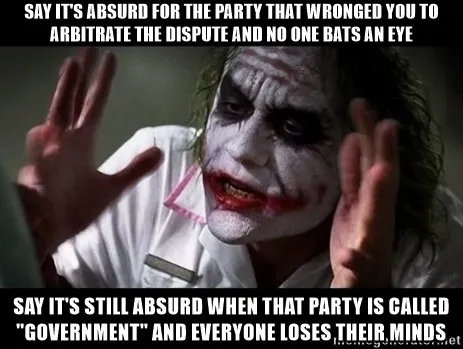Let's use a little thought experiment to work this through.

Image via PixaBay
Suppose you and I live somewhere out in the wide, wide world, me on my land that I've cultivated and you on yours. Then, one day, you come over and inform me that you've declared yourself the governing authority of all the land you can see, including the land I own and use, along with everything I've built on my land. You lay down the rules that will now be enforced by you through physical force on what I can and can't do, and you also tell me that you'll be taking a portion of my property to pay for the physical violence you'll visit on me for not following your rules. Lastly, you tell me that I can make a claim against you any time you break the rules you've set out, but I have to make that claim to you, and you are the sole arbiter of whether or not you have broken the rules.
Since I really don't want to fight you because you're a lot stronger and better armed than me, I submit, despite the fact I do not consent to it and tell you this. Later on, you come to take the property you said you would, but instead of just taking the portion you said you'd take, you take even more. I object to this and try to stop you, and you, in turn, beat me over the head and tell me to come to your house later to appeal the action. Not wanting to get hit again, I decide to go with it, so later on that day I come to your house to appeal your taking of more property than you said you would.
I point out what you were supposed to take, and I show you what was actually taken. Instead of using my time to improve my property or prepare food for myself, I petition you to return the property that you have actually stolen from me. After listening to my argument, you tell me that you needed more than you had initially told me in order to provide yourself the means to enforce the rules on me. You tell me that you haven't done anything wrong, and there was a legitimate reason for you to take the extra property, despite the fact that you've broken the rules.
When I try to tell you this is theft, you tell me that, by not fighting you off when you first laid claim over my land, I've consented to be bound by the rules you set out. When I point out, again, that you broke your own rules, you repeat that there was a very good reason for you to do that, and this very good reason exempts you from being subject to those rules. When I point out, in utter exasperation, that it is entirely unjust for you to decide whether or not you have broken the rules you made up, you tell me that if I keep this up, you're going to beat me up and throw me in a cage.
Does this situation sound patently absurd and immoral? That's because it is.
And yet, despite the obvious absurdity of this hypothetical, when you change the parties to "the governed" and "government" instead of "me" and "you," that sense of absurdity goes out the window. Somehow, when this same thought experiment is amplified into hundreds of millions of people, this same sort of situation is no longer absurd and immoral; it is considered justice. What's more, when you attempt to point out the absurdity of having one of the parties to a conflict be the sole arbiter of that conflict, you are met with incredulity, vitriol, and threats of actual violence to your person. It's as though you pointing out how utterly mad this situation is somehow becomes a personal attack on the people that deluded themselves into accepting it.

This is, of course, by design. The state can only exist so long as the people it rules over believe it has the authority to rule them. One of the ways the men and women who call themselves the state do this is by creating the illusion of justice. If they can convince the people they rule over that they really have their consent, and that they can change the terms of their servitude, they can convince them they aren't slaves. Once that task is accomplished, it's actually pretty damn simple to break the rules and be a completely arbitrary authority. So long as you can quote some vague, nebulous "greater good," there's literally nothing you can't get away with in that situation.
Remember, kids: if it's an absurd and immoral scenario when it's between two people, it's still an absurd and immoral scenario between the governed and the government.

Andrei Chira is a vaper, voluntaryist, and all-around cool dude. Formerly a paratrooper in the 82nd Airborne Division, he now spends his time between working at VapEscape in Montgomery County, Alabama, contributing to Seeds of Liberty on Facebook and Steemit, writing short fiction, and expanding his understanding of...well, everything, with an eye on obtaining a law degree in the future.